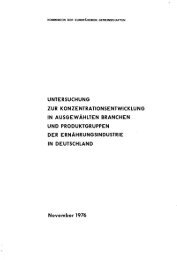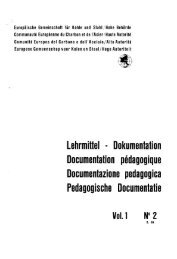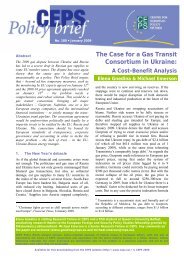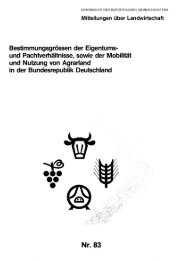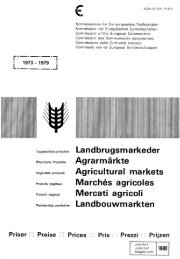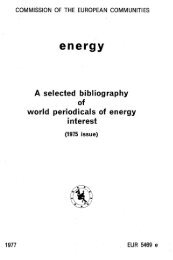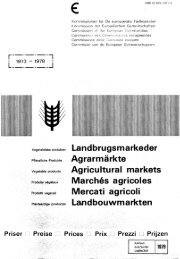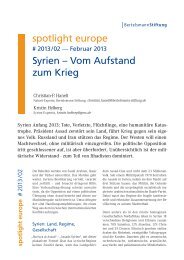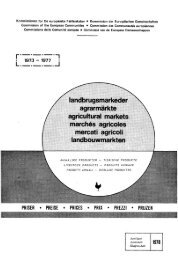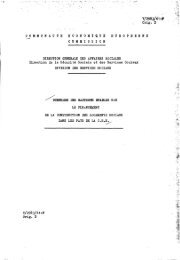Survey on Rules on Loss of Nationality in International Treaties and ...
Survey on Rules on Loss of Nationality in International Treaties and ...
Survey on Rules on Loss of Nationality in International Treaties and ...
You also want an ePaper? Increase the reach of your titles
YUMPU automatically turns print PDFs into web optimized ePapers that Google loves.
SURVEY ON RULES ON LOSS OF NATIONALITY IN INTERNATIONAL TREATIES AND CASE LAW 17<br />
Article 6 <strong>on</strong> “Name <strong>and</strong> Nati<strong>on</strong>ality” reads as follows:<br />
1. Every child shall have the right from his birth to a name.<br />
2. Every child shall be registered immediately after birth.<br />
3. Every child has the right to acquire a nati<strong>on</strong>ality.<br />
4. States Parties to the present Charter shall undertake to ensure that their C<strong>on</strong>stituti<strong>on</strong>al legislati<strong>on</strong> recognize<br />
the pr<strong>in</strong>ciples accord<strong>in</strong>g to which a child shall acquire the nati<strong>on</strong>ality <strong>of</strong> the State <strong>in</strong> the territory <strong>of</strong> which he<br />
has been born if, at the time <strong>of</strong> the child's birth, he is not granted nati<strong>on</strong>ality by any other State <strong>in</strong><br />
accordance with its laws.<br />
The African Charter does not <strong>in</strong>clude a provisi<strong>on</strong> that forbids arbitrary deprivati<strong>on</strong>. However, the message that<br />
every child has the right to acquire a nati<strong>on</strong>ality has to be kept <strong>in</strong> m<strong>in</strong>d when <strong>in</strong>terpret<strong>in</strong>g loss provisi<strong>on</strong>s.<br />
3.4 Comm<strong>on</strong>wealth <strong>of</strong> Independent States C<strong>on</strong>venti<strong>on</strong> <strong>on</strong> Human Rights <strong>and</strong><br />
Fundamental Freedoms (M<strong>in</strong>sk, 26 May 1995) 70<br />
The 1995 Comm<strong>on</strong>wealth <strong>of</strong> Independent States C<strong>on</strong>venti<strong>on</strong> <strong>on</strong> Human Rights <strong>and</strong> Fundamental Freedoms<br />
guarantees <strong>in</strong> its Article 24:<br />
1. Every<strong>on</strong>e shall have the right to citizenship.<br />
2. No <strong>on</strong>e shall be arbitrarily deprived <strong>of</strong> his citizenship or <strong>of</strong> the right to change it.<br />
The use <strong>of</strong> the word “citizenship” <strong>in</strong>stead <strong>of</strong> “nati<strong>on</strong>ality” is remarkable. The background <strong>of</strong> this is the fact<br />
that <strong>in</strong> the Russian language <strong>and</strong> <strong>in</strong> the Russian legal system, a difference existed between “citizenship” –<br />
which <strong>in</strong>dicates the l<strong>in</strong>k between a pers<strong>on</strong> <strong>and</strong> the State – <strong>and</strong> “nati<strong>on</strong>ality” – which <strong>in</strong>dicates the l<strong>in</strong>k<br />
between a pers<strong>on</strong> <strong>and</strong> an ethnicity. 71<br />
3.5 Arab Charter <strong>on</strong> Human Rights (22 May 2004) 72<br />
In the Arab Charter <strong>on</strong> Human rights <strong>of</strong> 15 September 1994, 73 which never came <strong>in</strong>to force, Article 24<br />
enshr<strong>in</strong>es the right to a nati<strong>on</strong>ality:<br />
“No citizen shall be arbitrarily denied <strong>of</strong> his orig<strong>in</strong>al nati<strong>on</strong>ality, nor denied his right to acquire<br />
another nati<strong>on</strong>ality without legal basis.”<br />
This provisi<strong>on</strong> evidently paraphrased Article 15 Universal Declarati<strong>on</strong> <strong>of</strong> Human Rights.<br />
70 http://www.unhcr.org/refworld/pdfid/49997ae32c.pdf.<br />
71 In the Glossary <strong>on</strong> the website <strong>of</strong> the Eudo-citizenship project, the follow<strong>in</strong>g remarks are made: “While modern<br />
<strong>in</strong>ternati<strong>on</strong>al law uses the term 'nati<strong>on</strong>ality' to refer to the legal b<strong>on</strong>d between an <strong>in</strong>dividual <strong>and</strong> a sovereign state,<br />
Russian domestic law uses the term 'citizenship' (grazdanstvo - гражданство). Accord<strong>in</strong>g to Russian legislati<strong>on</strong>, there is<br />
strik<strong>in</strong>g difference between citizenship (grazdanstvo - гражданство) <strong>and</strong> nati<strong>on</strong>ality (nati<strong>on</strong>al’nost’ - национальность).<br />
In c<strong>on</strong>sequence, <strong>in</strong> the Russian c<strong>on</strong>text, the term ‘citizenship’ cannot be used as a syn<strong>on</strong>ym for nati<strong>on</strong>ality.”<br />
The C<strong>on</strong>stituti<strong>on</strong> <strong>of</strong> the Russian Federati<strong>on</strong> dist<strong>in</strong>guishes between these two legal def<strong>in</strong>iti<strong>on</strong>s. Thus, under Article 6 <strong>of</strong><br />
the Russian C<strong>on</strong>stituti<strong>on</strong>, citizenship (grazdanstvo - гражданство) <strong>of</strong> the Russian Federati<strong>on</strong> shall be acquired <strong>and</strong><br />
term<strong>in</strong>ated accord<strong>in</strong>g to federal law; it shall be <strong>on</strong>e <strong>and</strong> equal, irrespective <strong>of</strong> the grounds <strong>of</strong> acquisiti<strong>on</strong> (Article 6 (1); a<br />
citizen <strong>of</strong> the Russian Federati<strong>on</strong> may not be deprived <strong>of</strong> his or her citizenship (grazdanstvo - гражданство) or <strong>of</strong> the<br />
right to change it (Article 6 (3). At the same time, with regard to Article 26 (1) <strong>of</strong> the Russian C<strong>on</strong>stituti<strong>on</strong> the term<br />
‘nati<strong>on</strong>ality’ (nati<strong>on</strong>al’nost’ - национальность) is associated with the ethnicity <strong>of</strong> the pers<strong>on</strong>: ‘Every<strong>on</strong>e shall have the<br />
right to determ<strong>in</strong>e <strong>and</strong> <strong>in</strong>dicate his nati<strong>on</strong>ality (nati<strong>on</strong>al’nost’ - национальность). No <strong>on</strong>e may be forced to determ<strong>in</strong>e<br />
<strong>and</strong> <strong>in</strong>dicate his or her nati<strong>on</strong>ality (nati<strong>on</strong>al’nost’ - национальность). As a result, <strong>in</strong> the Russian language, the term<br />
nati<strong>on</strong>ality (nati<strong>on</strong>al’nost’ - национальность) refers to <strong>in</strong>dividual membership <strong>in</strong> a nati<strong>on</strong> (нация) as a cultural,<br />
l<strong>in</strong>guistic <strong>and</strong> historic community.” (http://eudo-citizenship.eu/databases/citizenship-glossary/term<strong>in</strong>ology, accessed <strong>on</strong><br />
1 July 2013). Compare also the term<strong>in</strong>ological remarks made <strong>in</strong> De Groot (2012b).<br />
72<br />
http://www1.umn.edu/humanrts/<strong>in</strong>stree/loas2005.html?msource=UNWDEC19001&tr=y&auid=3337655 (accessed<br />
<strong>on</strong> 1 July 2013)<br />
73 http://www1.umn.edu/humanrts/<strong>in</strong>stree/arabcharter.html (accessed 1 July 2013)



